The Ballad of Joni & Malka: A Writer Recounts a Decades-Long Friendship with Joni Mitchell

In 1973, after Malka’s first interview with Joni in L.A., and as Joni was rehearsing for her Court and Spark album, famed sound engineer and collaborator Henry Lewy snapped this photo of the pair on their way to Neil Young’s place. Photo: Marcy Gensic/courtesy of Malka Marom
Joni Mitchell has repeatedly surprised fans by appearing at the Newport Folk Festival in 2022, dropping her At Newport album this July and headlining her first concert in more than 20 years at the Gorge. As she turns 80 on Nov. 7, we revisit a story from our Aug./Sept. 2023 issue in which an Israeli Canadian journalist recounts one night in Toronto in 1966 that kickstarted their 57-year friendship.
On the morning of June 11, I was sipping my first coffee on a balcony overlooking the Mediterranean in the Israeli city of Herzliya, but in spirit I was with Joni Mitchell at the Gorge in Washington State. It was showtime. Her first time in 23 years headlining a show. Must be cold in that amphitheatre at night, I thought, but the heat of the giant stage lights should keep her warm. “I’m a little excited,” Joni told me on the phone three days before. I had butterflies, I was so excited and so thrilled she was performing under the open skies. Joni broke through every ceiling, not just the glass one.
Then, just when I was aching to be at that concert, my phone started pinging like crazy with incoming texts:
“Malka, Joni is talking about you.”
“Malka, Joni referred to you as ‘my girlfriend’ …”
“Malka, check this video of Joni telling …”
Ten thousand kilometres shrank to zero, and I saw Joni telling the world what I’d told her on the phone: of immense Israeli street protests against religious dictatorship, and of amazing musicians — Palestinian and Israeli — who formed a band they named Both Sides Now to perform her songs in Arabic, Hebrew and English.
You could have scraped me off the moon, I was so elated that my “girlfriend” Joni, the visionary who sang of environmental issues decades ago, was still speaking out! The devastating brain aneurysm she suffered in 2015 had not diminished her social conscience one iota. My eyes teared as the audience of 27,000 people applauded the awesome power of Joni’s music — and her resilience.
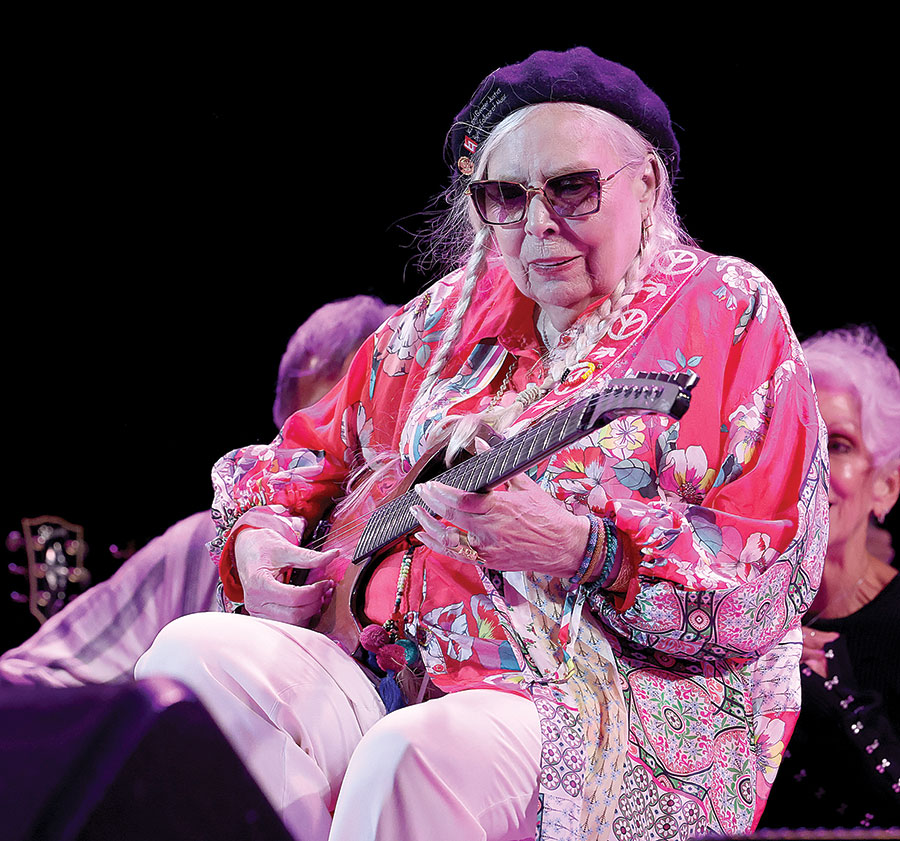
In 2015, my life stopped while Joni remained unconscious in intensive care for weeks on end and no one knew if she’d survive that devastating aneurysm. Even months after she returned home, she looked as though a mere whisper would shatter her, she was so frail. And so drained. There was not even one drop in her to keep her head upright; it drooped to the side. Leaning close to her bedside, I’d repeat close to her ear, like a mantra: “You’ll regain your strength, your words, your memory, your mobility, Joni. Your willpower pulled you through polio, it will pull you though this, too …” I believed every word of it. I desperately wanted to believe it.
To me it was a miracle that Joni made it to the Gorge; a miracle that she took control of a concert nearly three hours long; a miracle that she chose to sing solo, not her greatest hits, but the challenging and deeply meaningful Shine and If, that only she could do justice to, even though she has lost her high register. Yet how luscious the deep voice she gained — loaded with wisdom, generosity and love. I lost it when she sang the secret to how she overcame this blow — more devastating than the polio she suffered as a child, according to her — with Rudyard Kipling’s words to inspire us all:
If you can force your heart
Nerve and sinew
To serve you
After all of them are gone
And so hold on
When there is nothing in you
Nothing but the will
That’s telling you to hold on
Hold on
It tickled my heart to hear her referring to me as her girlfriend even now that she’s a grandmother and I’m a great-grandmother.
Girlfriends for more than 50 years, though we’ve lived in different countries. Our every visit is a special occasion. We still love to dress up, even for just one another. Once Joni came to my place wearing an Issey Miyake coat so intricate she asked Marv, my late husband, to help her put it on as she was leaving. Marv tried and tried, then stopped and said, “Joni, does this coat come with instructions or a map?” She laughed her head off.
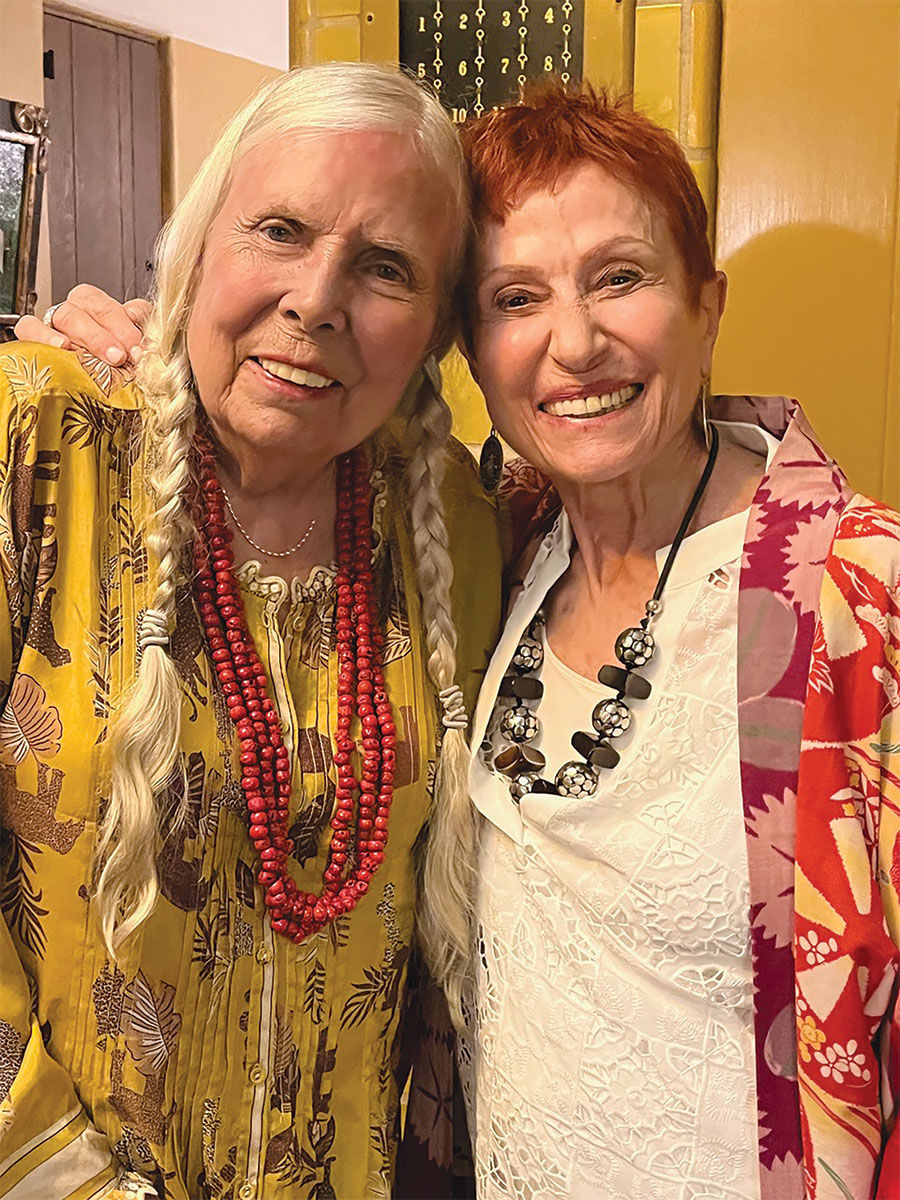
Joni loves to laugh, and she can be quite the prankster. One night, at the conclusion of the Rolling Thunder Revue in Toronto, she asked me, “Would you like to meet Dylan?”
“No, I hate those after-the-show dressing-room scenes. It’s embarrassing what people do just to boast ‘I met so and so…’”
“But Dylan is not so and so.”
“I don’t want to meet Dylan, Joni. Let’s go grab some Chinese food.”
“But you must meet Dylan, one of the greatest in our generation,” Joni insisted as she grabbed my wrist, dragging me past the scary-looking guys securing the inner sanctum where Bob Dylan stood half-naked, his shoulder bleeding from the pull of his guitar strap, sweat dripping over his white clown makeup.
“Bobby,” Joni said as she pulled me to face him, “I’d like you to meet the only person I know who doesn’t want to meet you.”
I first met Joni 57 years ago, at the best of times, professionally, and the worst, personally. I’d been stuck in a bad marriage since I was 18, had two little children, and I was in Toronto, a world away from family, friends and support network in my native Israel. Afraid to return home after I’d taped the weekly CBC TV show I headlined with my singing partner, Joso Spralja, I drove in circles around Toronto alone, for hours.
The streets were deserted, dark and cold, and even Yorkville’s flower children had taken shelter for the night. The only light I saw illuminated the entrance to the Riverboat coffeehouse, a sort of second home for me. I’d performed there and came often to catch other musicians. But I’d never seen it as empty as it was on that November night in 1966.
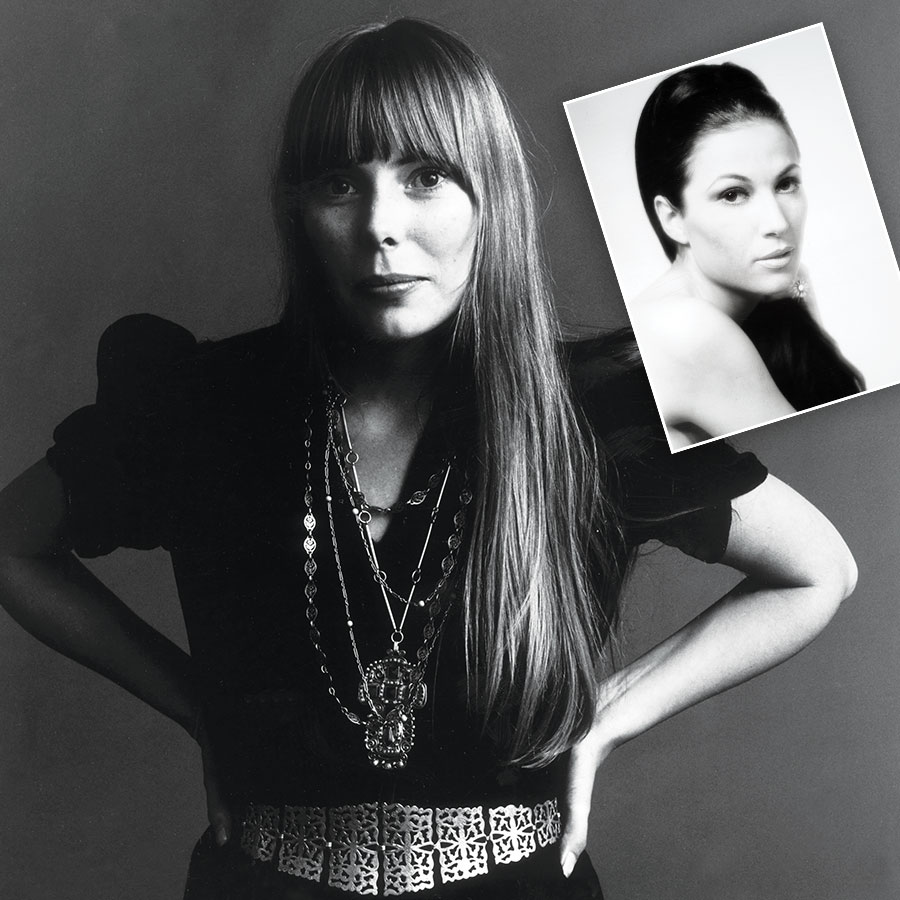
A girl, who must have picked out her miniskirt at Goodwill, kept tuning and retuning a guitar onstage. I thought she was a new server play-acting at being the performer. My cappuccino stood empty and still she kept turning the knob of one string, then another. As I was about to leave, she leaned closer to the mike and strummed a progression of chords unlike any I’d heard before. She swooped her long blond hair to cover her face, almost like she wanted to disappear and let the music be who she was. And when she sang, her music and verses formed a sort of kaleidoscope that splintered my perception, turned it round and round, then refocused to illuminate a reality I had not dared to see. The more she sang, the more her voice became my own:
“I had a king …
Who carried me off to his country
for marriage too soon …
I can’t go back there anymore/You know my keys won’t fit the door/ You know my thoughts don’t fit the man/They never can.”
My marriage was a bust. I knew that instant there was no more escaping into hope, denial or fear.
This girl broke me, yet her unique gifts generated such an elation inside me I applauded till my hands burned. As she stepped off the platform, I sprinted to her, gushing like a lunatic, wildly high: “What an artist you are! What a musician! Where did you find these incredible songs?”
“I wrote them,” she replied, her voice tenuous.
“You did?! My God, what an enormous talent you are! Immense! How powerful and deeply moving your songs! As great as Bob Dylan’s and Leonard Cohen!”
“Really?” she muttered. “Really?” As if I was the first to tell her that her songs were of the same calibre as the greatest of our generation.
“Really, really. You’re going to be acclaimed the world over, or else this world is a much dumber place than it appears to be. Who are you?”
“Joni Mitchell.”
“I’m Malka.”
“I know who you are,” she said.
She probably saw me on TV, like millions in Canada. My singing duo, Malka & Joso, came to be recognized as a major force in changing the perception that Canada’s immigrants were not aliens, but importers of vitality, hope, daring, ancient and avant-garde sophistication, humour and culture. We packed concert halls and coffeehouses even though we sang in 14 languages, with only one or two songs in English and French. We, immigrants from Israel and Yugoslavia, were the first to bring world music to prime time in Canada — after decades of being relegated to basements of churches and community centres as if there were something subversive about it. One couldn’t turn on a radio in Canada without hearing our songs.
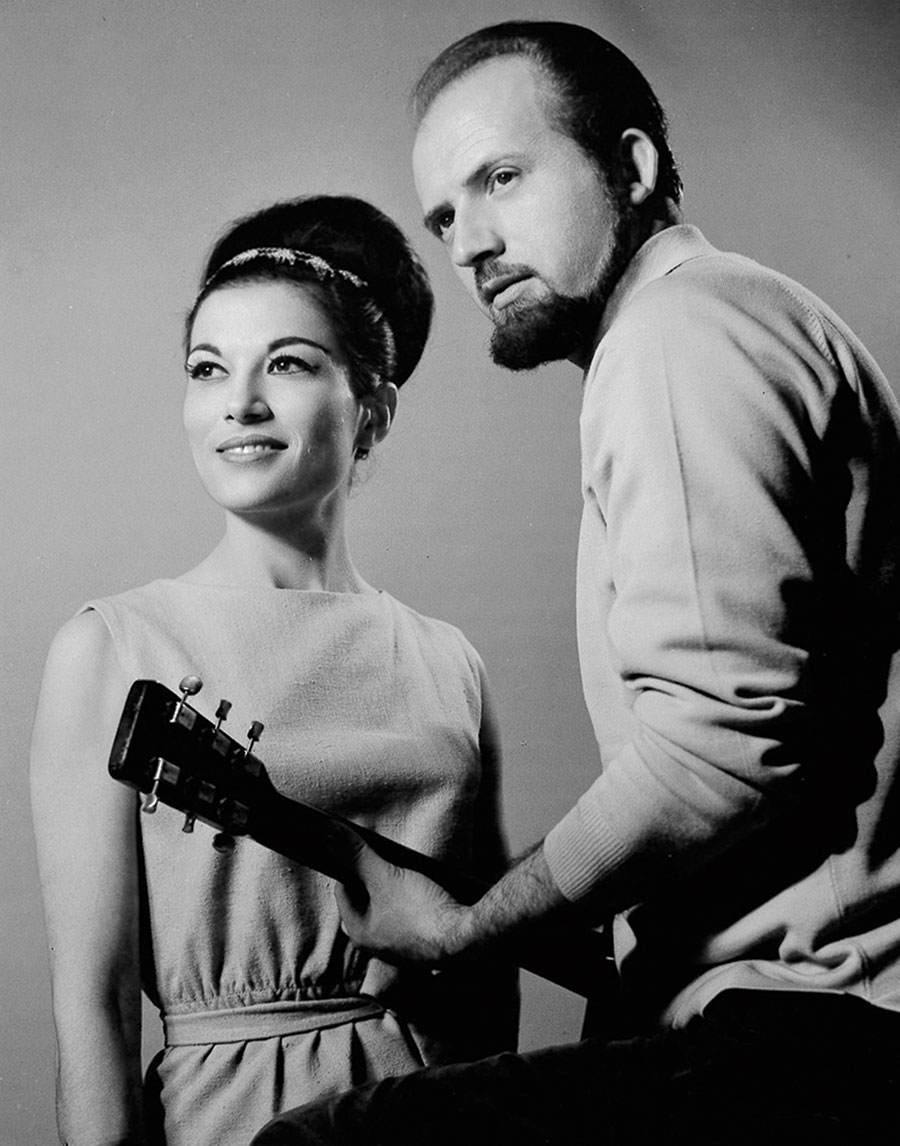
I tried to get Joni a recording contract. A day after I met her, I drove the A&R man at Capitol Records Canada to the Riverboat. He kept drumming his fingers on the table while Joni tuned and retuned her guitar. His impatience blocked his perception. By the time Joni sang Both Sides Now, he had no ears to hear her. “This singer has no stage presence. She’ll amount to nothing,” he decreed, then left.
After her closing set at that Riverboat gig, I asked Joni for her OK to sing some of her songs in my gigs. Right there, Joni scribbled the lyrics of I Had a King, Both Sides Now and The Circle Game. I sang them and advised the audience to remember the name Joni Mitchell so that they could boast later that they’d heard her songs before she became famous. By and by destiny pulled a switch on us; while my time onstage was winding down, Joni was stepping into the light.
Joni and I lost contact for the next seven years.
Then, in November 1973, CBC Radio offered me a gig interviewing her — if I could land the interview.
No way would Joni remember me, I thought. She was a megastar by then, which made me feel like a fortune teller who got it right. But she kept rejecting countless journalists, and pre-Google it was quite the trip to find a contact number for her. I braced myself for a rejection when I called her management office.
“May I speak with Joni?” I asked the receptionist.
“Does Joni know you?” she responded.
“I don’t know. We briefly met seven years ago.”
“Who shall I say wants to speak with her?”
“Malka.”
“What’s your number?” she asked me in that “don’t call me, I’ll call you” tone.
I pretty much abandoned hope on the spot. Yet, an hour or so later, my phone rings and I hear “Malka! It’s Joni, so glad to hear from you! How are you?”
“I’ve branched out to journalism, remarried, and bought a house with a big mortgage, so I could use an interview with you,” I replied.
“Sure, come over. We’re in rehearsals, so I won’t have full time to give you but come over.” Just like that, the seven-year separation melted.
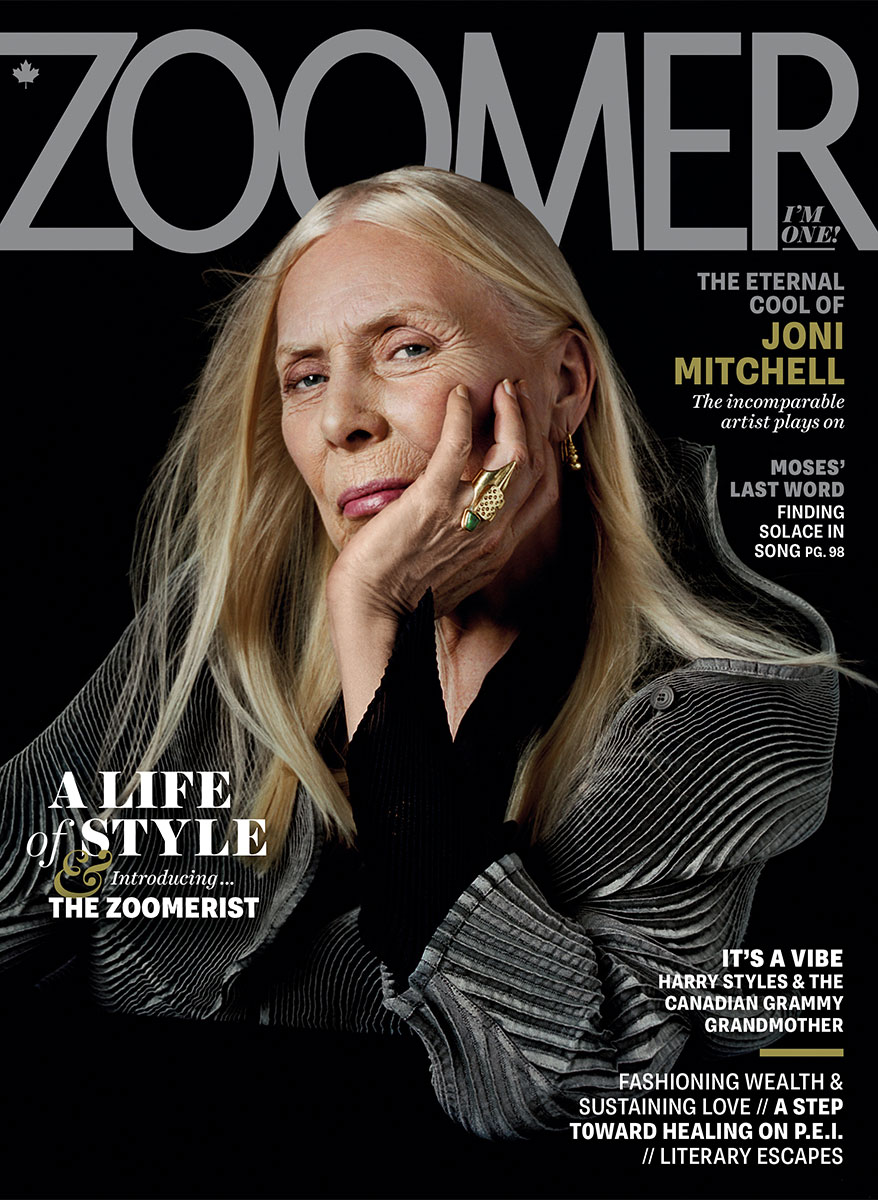
I recorded the ’73 interview in the kitchen of a Los Angeles house David Geffen had rented from Julie Andrews. And after Joni and I got to the rehearsal hall, what a thrilling surprise it was to hear Joni sing live with the L.A. Express jazz band that had backed her on her mega-hit album, Court and Spark.
During the interview Joni told me, off the record, about her efforts to find the baby girl she had had “out of wedlock.” I kept that tape in my safety deposit box for more than 20 years until it became common knowledge. Years later, the producer of a Joni Mitchell documentary told me I was stupid to keep such a secret for decades: “A real journalist would be loyal to the story, not to her friend.”
Maybe so, but I’ll gladly be stupid for friendship, even for any one of our marathon phone calls, all-night catch-up visits, waiting together for the birth of a grandchild, or the laughs — like when Joni flew over to visit my cat. “I can visit with you on the phone, but not Sampson,” she explained.
After my book Joni Mitchell: In Her Own Words was published in 2014, readers of all ages from all over the world sent me requests to convey to Joni how it just so happened that, at the lowest point of their life, her songs inspired them to act, change, heal. I understood that all too well. Though I’ve had the privilege of being Joni’s friend, it was her art that moved me first.

On that night in June, 27,000 strong at the Gorge beamed their gratitude and love to Joni with their phone lights. She saw them as stardust. To them, and to me, she will always be golden.
A version of this article appeared in the Aug./Sept. 2023 issue with the headline ‘The Ballad of Joni & Malka’, p. 36.
RELATED:
Contributor Spotlight: Malka Marom on Her Most Memorable Interviews and Her Current Passion Project
Song for Joni: Tracing a Life Inspired by the Music of Joni Mitchell